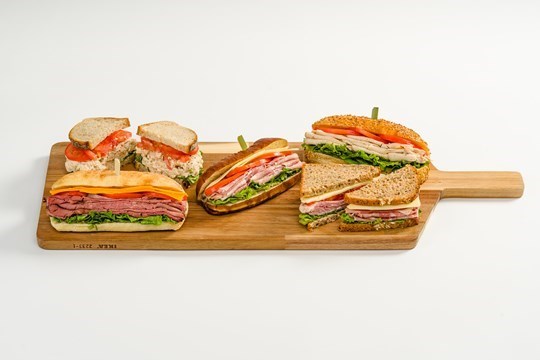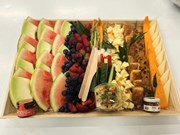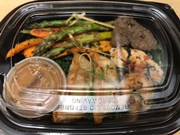Understanding the Needs of Corporate Clients
Identifying dietary restrictions and preferences is a crucial aspect of catering for corporate lunches, as it demonstrates a commitment to providing a personalized and inclusive dining experience for clients. In the corporate setting, individuals may have a wide range of dietary needs and preferences, including allergies, religious restrictions, or personal lifestyle choices such as vegetarian or vegan diets. By taking the time to proactively gather and accommodate these requirements, catering providers can enhance customer satisfaction and ensure that all attendees feel valued and cared for during the lunch event.
When initially engaging with corporate clients to discuss catering options, it is advisable to inquire about any dietary restrictions or preferences among the attendees. This may involve sending out a survey or questionnaire to gather relevant information ahead of time. By collecting these details early in the planning process, caterers can make informed menu choices and adjustments to accommodate specific needs. Moreover, having a clear understanding of dietary restrictions allows caterers to provide appropriate alternatives or modifications to ensure that all guests can enjoy a delicious meal without any concerns about allergens or incompatible ingredients.
In addition to asking about individual dietary restrictions, it is also important to be mindful of broader dietary trends and preferences. For example, offering a variety of menu options that cater to different eating styles, such as gluten-free, keto-friendly, or plant-based dishes, can cater to a diverse range of guests and demonstrate a commitment to inclusivity. By showcasing a thoughtful and accommodating approach to menu planning, catering providers can position themselves as flexible and responsive partners in meeting the unique needs of corporate clients.
Furthermore, by proactively addressing dietary restrictions and preferences, catering providers can showcase their attention to detail and commitment to customer care. Clients are more likely to appreciate and remember the efforts made to ensure that their dietary needs are met, leading to positive feedback and potential future business opportunities. In the competitive catering industry, going above and beyond to accommodate diverse dietary requirements can set a provider apart and contribute to building a strong reputation for professionalism and customer-centric service.
Understanding the needs of corporate clients extends beyond merely providing delectable food options. When catering for corporate lunches, it is imperative to consider the intricate details that contribute to a successful dining experience. One crucial aspect that demands careful attention is the timing and delivery requirements of the corporate setting.
Corporate environments are often governed by strict schedules and timelines. Meetings, presentations, and other business activities typically follow a predetermined agenda, leaving little room for delays or disruptions. As such, catering services must align their delivery timing with the specific requirements of the client to ensure a seamless dining experience.
First and foremost, catering providers need to establish clear communication channels with corporate clients to understand their schedule constraints. Clients may have distinct preferences regarding meal times, such as aligning lunch delivery with a specific break period or coordinating a working lunch during a meeting. By gathering detailed information on the timing preferences of the client, catering services can tailor their offerings to suit the specific needs of the corporate event.
Moreover, the logistics of food delivery play a pivotal role in meeting the timing requirements of corporate lunches. Catering companies must map out efficient delivery routes to ensure that meals arrive promptly at the designated venue. Timeliness is of the essence in a corporate setting, where delays in meal service can disrupt the flow of meetings and impact overall productivity.
In addition to timing considerations, catering services must also take into account the mode of delivery that best suits the corporate client’s needs. Some clients may prefer individual meal packaging for convenience and hygiene purposes, while others may opt for buffet-style setups to promote networking and interaction among attendees. Understanding the delivery preferences of the client enables catering providers to offer tailored solutions that align with the corporate culture and objectives.
Ultimately, by carefully considering the timing and delivery requirements of corporate clients, catering services can enhance the overall dining experience and contribute to the success of corporate lunches. Attention to detail, efficient communication, and logistical precision are key elements in meeting the unique demands of the corporate environment and creating a memorable dining experience for clients and attendees alike.
Menu Planning and Options
Offering a variety of choices, such as healthy, vegetarian, and gluten-free options, is a crucial aspect of catering for corporate lunches. By catering to diverse dietary needs and preferences, you can ensure that all attendees are accommodated and satisfied with the meal selection.
When planning a corporate lunch menu, it is essential to consider the varying dietary requirements of participants. Incorporating healthy options allows individuals to make nutritious choices, promoting overall well-being and productivity during the workday. Including dishes that are rich in vitamins, minerals, and dietary fiber can contribute to increased energy levels and improved focus among the attendees.
Vegetarian options cater to individuals who do not consume meat or animal products. By offering flavorful vegetarian dishes, you demonstrate inclusivity and respect for different dietary choices. These options can include a variety of plant-based proteins, such as tofu, legumes, nuts, and seeds, ensuring that vegetarian attendees have fulfilling and tasty meal alternatives.
Furthermore, providing gluten-free options is essential for individuals with gluten sensitivities or celiac disease. By offering gluten-free dishes that are prepared carefully to avoid cross-contamination, you show your commitment to accommodating special dietary needs. This attention to detail reassures attendees with gluten intolerances that their dietary restrictions have been thoughtfully considered and addressed.
Incorporating a diverse range of choices in your corporate lunch menu demonstrates your commitment to inclusivity and customer satisfaction. It allows each attendee to enjoy a meal that aligns with their dietary preferences and restrictions, fostering a positive dining experience. Additionally, offering a variety of options can enhance the overall perception of your catering service, showcasing your versatility and ability to tailor menus to meet specific requirements.
In conclusion, providing a selection of healthy, vegetarian, and gluten-free choices in your corporate lunch catering menu is essential for meeting the diverse dietary needs of attendees. By offering a range of options, you can ensure that all participants feel valued and cared for, contributing to a successful and enjoyable dining experience. Prioritizing menu diversity and inclusivity demonstrates your commitment to delivering high-quality catering services tailored to the unique preferences of corporate clients.
When catering for corporate lunches, the decision between offering buffet or individual meal options is crucial in ensuring the success of the event. Each option has its own set of advantages and considerations that caterers must carefully weigh to meet the specific needs of their corporate clients.
Buffet-style catering presents a versatile and interactive dining experience. It allows guests to select their preferred dishes from a variety of choices laid out on serving stations. This format encourages networking and socialization among attendees as they move around the buffet area, creating a more dynamic atmosphere during the lunch event. Additionally, buffet setups can accommodate diverse dietary preferences and restrictions more easily, offering a wider array of dishes to cater to various tastes and requirements.
On the other hand, individual meal options provide a more personalized and streamlined dining experience. Each guest receives a pre-portioned meal that is plated and served to them directly, eliminating the need for queuing and making the dining process more efficient. This approach is often preferred in more formal corporate settings where a sit-down meal service is desired to convey a sense of exclusivity and attention to detail. Individual meals also allow for greater control over portion sizes and presentation, ensuring a consistent dining experience for all guests.
When deciding between buffet and individual meal options for corporate lunches, caterers should consider factors such as the nature of the event, the preferences of the client, and the logistical constraints of the venue. Buffet setups are well-suited for casual or larger gatherings where flexibility and variety are valued, while individual meal services are better suited for more intimate or formal occasions where a more structured dining experience is desired.
It is also important to take into account practical considerations, such as available space, serving staff requirements, and the overall flow of the event. Buffets may require more space for setup and guest movement, as well as additional staff to manage food replenishment and cleanliness. In contrast, individual meal services often require a higher level of precision in meal preparation and plating to ensure consistent quality and presentation for each guest.
Ultimately, the choice between buffet and individual meal options should align with the overall objectives of the corporate lunch event and cater to the preferences and expectations of the clients. By carefully evaluating the unique advantages and considerations of each catering format, caterers can deliver a dining experience that satisfies both the culinary and experiential needs of corporate clients.
Presentation and Setup
Professional presentation and branding are crucial aspects of catering for corporate lunches as they contribute to the overall image and perceived value of the service. When focusing on professional presentation, catering providers should pay attention to every detail to create a visually appealing setup that aligns with the corporate environment. This includes using high-quality servingware and utensils, ensuring food displays are visually enticing, and maintaining a clean and organized presentation.
Branding plays a significant role in reinforcing a company's identity and messaging. While catering for corporate lunches, incorporating elements of the client's branding, such as colors, logos, or taglines, into the presentation can help create a customized experience that resonates with the attendees. This attention to branding not only enhances the aesthetic appeal of the catering setup but also showcases a level of dedication and professionalism that clients appreciate.
One way to focus on professional presentation and branding is to create a cohesive theme or design scheme that reflects the client's corporate identity. This can be achieved through the use of color coordination, branded signage or labels on food items, and even incorporating branded promotional materials or giveaways alongside the meal service. By seamlessly integrating the client's branding elements into the catering setup, providers demonstrate a commitment to delivering a tailored experience that goes beyond just serving food.
Moreover, attention to detail in the presentation can help elevate the perception of the catering service and leave a lasting impression on clients and guests. Neatly arranged food displays, garnished dishes, and elegantly presented platters all contribute to a sense of sophistication and professionalism. Additionally, ensuring that the serving staff are well-groomed, dressed appropriately, and trained in serving etiquettes reinforces the overall professional image of the catering service.
It is important to remember that professional presentation and branding are not just about visual aesthetics but also about creating an immersive and memorable experience for clients. By paying close attention to these aspects, catering providers can differentiate themselves in a competitive market, build stronger relationships with corporate clients, and ultimately enhance the overall success and reputation of their catering business.
Ensuring easy setup and cleanup for clients is essential in providing a seamless catering experience for corporate lunches. By taking proactive steps to streamline the setup and cleanup processes, catering companies can further enhance their service quality and professionalism.
One key aspect to consider is the layout and organization of the catering setup. When setting up for a corporate lunch, it is crucial to arrange the food, beverages, utensils, and serving stations in a logical and accessible manner. This not only facilitates a smooth flow of service but also helps clients navigate the setup effortlessly. Clearly labeled stations and easy-to-follow instructions can further enhance the setup experience for clients, minimizing confusion and ensuring efficiency.
Moreover, offering disposable or eco-friendly serving ware can greatly simplify the cleanup process for clients. Opting for recyclable or biodegradable materials reduces the need for extensive washing or post-event cleanup, allowing clients to focus on their meetings or networking opportunities without the hassle of managing dishes and utensils. Providing trash bins and recycling receptacles in convenient locations encourages attendees to dispose of waste responsibly, promoting a tidy and organized environment throughout the event.
Another aspect to consider is the coordination of cleanup efforts between the catering staff and the client's on-site team. Clearly defining responsibilities and expectations regarding cleanup tasks can avoid any misunderstandings and ensure a swift and thorough post-event cleanup. Collaborating with venue staff or designated representatives from the client’s organization can help streamline the cleanup process, allowing for a prompt exit once the event concludes.
Additionally, offering optional cleanup services as part of the catering package can alleviate the burden on clients and provide them with a hassle-free experience. Whether it involves clearing tables, disposing of trash, or tidying up the catering area, having professional staff assist with cleanup activities demonstrates a commitment to client satisfaction and ensures that the event space is left in pristine condition.
By prioritizing easy setup and cleanup for clients, catering companies can differentiate themselves in a competitive market and leave a lasting impression on corporate clients. Through thoughtful planning, effective communication, and attention to detail in both setup and cleanup processes, caterers can elevate the overall catering experience and build long-lasting relationships with corporate partners.
Communication and Customer Service
Maintaining clear communication with clients throughout the catering process is essential for ensuring a successful corporate lunch experience. Effective communication serves as the foundation for understanding the client's needs, addressing any concerns promptly, and building a strong relationship based on trust and transparency.
From the initial inquiry to the final delivery of the catering service, keeping the lines of communication open is crucial. This starts with listening attentively to the client's requirements and preferences. By actively engaging in conversations and asking relevant questions, caterers can gain valuable insights into what the client envisions for their corporate lunch event. Clear communication at this stage helps to establish expectations and ensures that both parties are on the same page regarding menu choices, presentation, setup, and any special requests.
As the catering process progresses, regular updates and status reports can provide clients with peace of mind and demonstrate professionalism. Timely communication regarding menu changes, logistical details, and scheduling updates can help clients feel informed and reassured that their event is being handled with care and attention to detail. This proactive approach can also prevent any misunderstandings or last-minute issues that may arise during the preparation and execution of the catering service.
In the event of unexpected challenges or adjustments to the original plan, transparent communication is key. If there are any delays, ingredient substitutions, or unforeseen circumstances that may affect the catering service, it is important to inform the client promptly and offer viable solutions. By being honest and upfront about any issues that arise, caterers can demonstrate accountability and a commitment to resolving challenges effectively while maintaining the client's trust.
Additionally, providing clients with multiple communication channels, such as phone, email, and messaging platforms, can enhance accessibility and responsiveness. Being available to address client inquiries and concerns in a timely manner reflects a dedication to customer service excellence. By promptly addressing any questions or feedback from clients, caterers can demonstrate their commitment to meeting and exceeding client expectations throughout the catering process.
Overall, clear communication is a cornerstone of successful corporate lunch catering. By actively engaging with clients, providing regular updates, addressing any issues transparently, and offering responsive customer service, caterers can foster positive relationships, build trust, and ensure a seamless and enjoyable experience for their corporate clients.
Providing exceptional customer service is integral to ensuring client satisfaction when catering for corporate lunches. In the corporate world, where time is of the essence and professionalism is highly valued, offering top-notch service can set your catering business apart and contribute to long-term client relationships.
To achieve exceptional customer service, it is essential to prioritize communication and responsiveness. Promptly responding to inquiries, addressing concerns, and accommodating special requests demonstrate a commitment to meeting clients' needs effectively. Establishing clear channels of communication, whether through email, phone calls, or in-person meetings, fosters trust and transparency between the catering service and the corporate clients.
Moreover, going the extra mile in customer service can leave a lasting positive impression. This could include personalized touches such as handwritten thank-you notes, complimentary upgrades or samples, or providing exceptional attention to detail in the presentation of the catering spread. By exceeding expectations and showing genuine care for the client experience, you not only ensure satisfaction but also increase the likelihood of repeat business and recommendations within the corporate community.
Another aspect of exceptional customer service in corporate catering is being adaptable and solution-oriented. Corporate clients often have specific requirements or last-minute changes, and being flexible and accommodating in such situations can be a game-changer. Whether it involves adjusting the menu to cater to unexpected dietary restrictions or accommodating a sudden increase in the number of attendees, being proactive and solution-driven can earn the trust and appreciation of clients.
Furthermore, post-event follow-up is a critical component of providing exceptional customer service. Reach out to clients after the corporate lunch to gather feedback on the catering experience. Actively listening to their comments, suggestions, and criticisms demonstrates a commitment to continuous improvement and shows that their opinions are valued. Incorporating client feedback into future catering services not only increases client satisfaction but also showcases a dedication to enhancing the overall customer experience.
In conclusion, exceptional customer service is a cornerstone of client satisfaction in corporate catering. By prioritizing communication, responsiveness, personalized touches, adaptability, and post-event follow-up, catering businesses can build strong relationships with corporate clients and differentiate themselves in a competitive market. Striving for excellence in customer service is not only good for client retention but also for fostering a positive reputation and securing future business opportunities in the corporate sector.
Feedback and Continuous Improvement
Gathering feedback from clients is a crucial step in ensuring the success and continuous improvement of catering services for corporate lunches. By actively seeking input from clients, catering providers can gain valuable insights into their preferences, requirements, and overall satisfaction levels. Feedback serves as a powerful tool for identifying areas of strength and areas needing improvement, guiding catering companies towards delivering a more tailored and high-quality service.
One effective way to gather feedback is through post-event surveys or follow-up emails sent to clients after the lunch catering service. These surveys can include questions about the menu choices, presentation, timeliness of delivery, and overall experience. Encouraging clients to provide detailed feedback, including specific suggestions for improvement, can offer valuable insights that may not have been apparent otherwise.
It is essential to approach feedback collection with a receptive and open mindset, acknowledging both positive comments and constructive criticism. Positive feedback highlights successful aspects of the catering service that can be emphasized and built upon in future engagements. On the other hand, constructive feedback provides opportunities for growth and refinement, allowing catering providers to address any shortcomings and enhance their offerings.
Analyzing the feedback collected from clients requires a systematic approach, looking for common themes and trends that emerge across different responses. Identifying recurring feedback points enables catering companies to prioritize areas for improvement and implement targeted changes that align with client preferences and expectations.
Incorporating feedback into the continuous improvement process is key to refining catering services for corporate lunches. By actively listening to clients' suggestions and experiences, catering providers can adapt their menus, presentation styles, and service offerings to better meet the evolving needs of corporate clients. This iterative approach to feedback and improvement fosters a culture of excellence and responsiveness within the catering industry.
Moreover, demonstrating a commitment to acting upon client feedback can enhance trust and loyalty among corporate clients. When clients see that their opinions are valued and that changes are implemented based on their input, they are more likely to return for future catering needs and recommend the service to others.
In conclusion, gathering feedback from clients for future enhancements is a fundamental practice that drives the evolution and refinement of catering services for corporate lunches. By actively soliciting feedback, carefully evaluating responses, and implementing meaningful changes, catering providers can elevate the quality of their offerings and cultivate lasting relationships with corporate clients.
Regularly reviewing and improving catering processes for corporate lunches is crucial in maintaining a high standard of service and meeting the evolving needs of corporate clients. By consistently evaluating the effectiveness of current practices and making necessary adjustments, catering businesses can stay competitive and enhance their reputation in the corporate catering industry.
One key aspect of this process is conducting post-event evaluations with clients. By seeking feedback on various aspects of the catering service, such as food quality, presentation, and overall experience, caterers can gain valuable insights into areas that require improvement. Analyzing feedback allows catering businesses to identify recurring issues or trends that may be impacting client satisfaction, enabling them to address these issues proactively.
Another way to improve catering processes is to regularly assess the menu offerings and update them to include fresh and innovative options. In the corporate setting, where clients may have diverse preferences and dietary requirements, it is essential to offer a range of choices that cater to different needs. By periodically reviewing and updating menus, caterers can ensure that they are meeting the dietary preferences of their clients while also keeping the offerings interesting and appealing.
Moreover, staying abreast of industry trends and best practices is essential for continuous improvement in catering for corporate lunches. By attending industry events, workshops, and training sessions, catering businesses can stay informed about the latest developments in the field and incorporate new ideas into their processes. Experimenting with new techniques, ingredients, and presentation styles can help caterers stay ahead of the competition and offer unique and memorable dining experiences to their clients.
In addition to seeking feedback from clients, it is also beneficial to gather input from the catering team regarding their experiences and observations during events. Team members who are directly involved in the catering process can provide valuable insights into operational challenges, workflow efficiency, and areas for improvement. Encouraging open communication within the team fosters a culture of continuous learning and collaboration, leading to enhanced teamwork and productivity.
Overall, the commitment to regularly reviewing and improving catering processes demonstrates a dedication to excellence and customer satisfaction. By embracing a culture of continuous improvement, catering businesses can adapt to changing market demands, exceed client expectations, and position themselves as trusted partners for corporate events.




